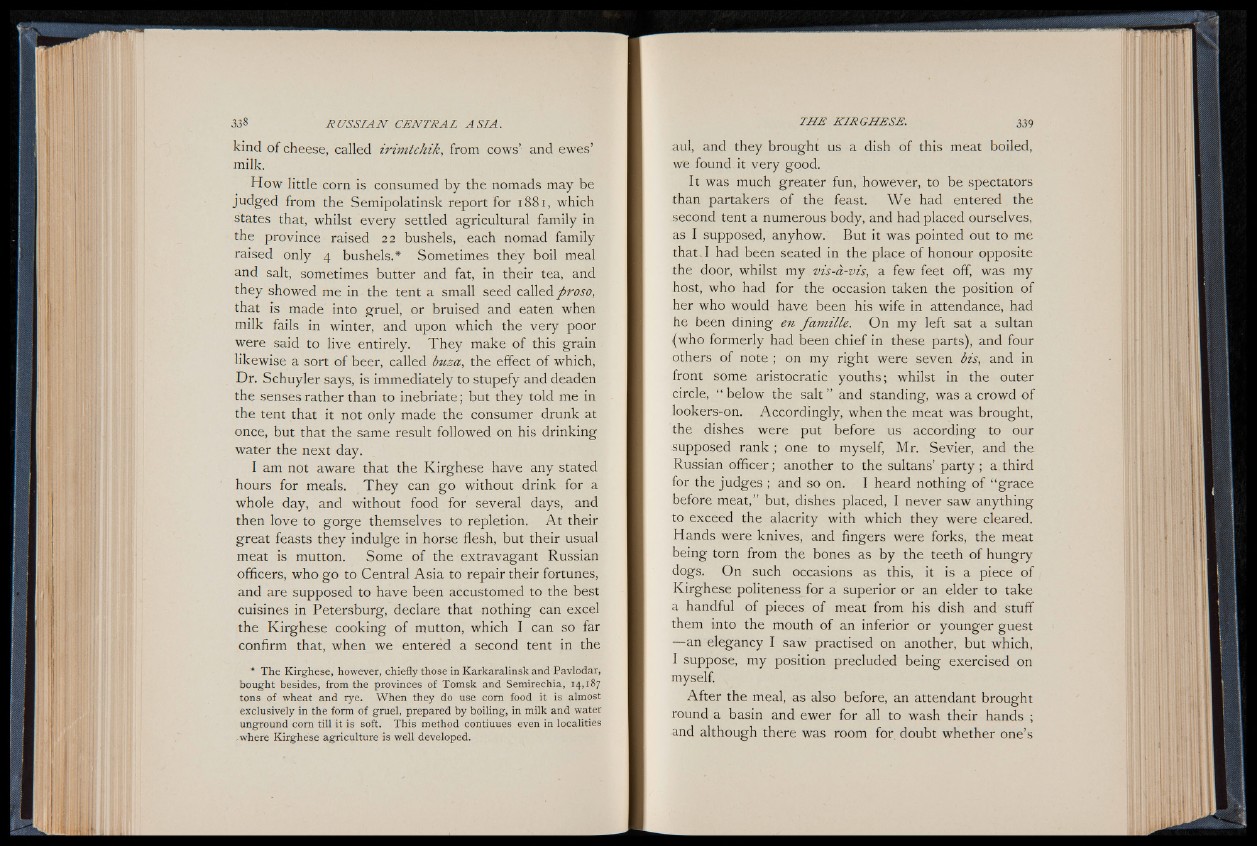
kind of cheese, called irimtchik, from cows’ and ewes’
milk.
How little corn is consumed by the nomads may be
judged from the Semipolatinsk report for 1881, which
states that, whilst every settled agricultural family in
the province raised 22 bushels, each nomad family
raised only 4 bushels.* Sometimes they boil meal
and salt, sometimes butter and fat, in their tea, and
they showed me in the tent a small seed called proso,
that is made into gruel, or bruised and eaten when
milk fails in winter, and upon which the very poor
were said to live entirely. They make of this grain
likewise a sort of beer, called buza, the effect of which,
Dr. Schuyler says, is immediately to stupefy and deaden
the senses rather than to inebriate; but they told me in
the tent that it not only made the consumer drunk at
once, but that the same result followed on his drinking
water the next day.
I am not aware that the Kirghese have any stated
hours for meals. They can go without drink for a
whole day, and without food for several days, and
then love to gorge themselves to repletion. A t their
great feasts they indulge in horse flesh, but their usual
meat is mutton. Some of the extravagant Russian
officers, who go to Central Asia to repair their fortunes,
and are supposed to have been accustomed to the best
cuisines in Petersburg, declare that nothing can excel
the Kirghese cooking of mutton, which I can so far
confirm that, when we entered a second tent in the
* The Kirghese, however, chiefly those in Karkaralinsk and Pavlodar,
bought besides, from the provinces of Tomsk and Semirechia, 14,187
tons of wheat and rye. When they do use com food it is almost
exclusively in the form of gruel, prepared by boiling, in milk and water
unground com till it is soft. This method contiuues even in localities
where Kirghese agriculture is well developed.
aul, and they brought us a dish of this meat boiled,
we found it very good.
It was much greater fun, however, to be spectators
than partakers of the feast. We had entered the
second tent a numerous body, and had placed ourselves,
as I supposed, anyhow. But it was pointed out to me
that.I had been seated in the place of honour opposite
the door, whilst my vis-à-vis, a few feet off, was my
host, who had for the occasion taken the position of
her who would have been his wife in attendance, had
he been dining en fam ille. On my left sat a sultan
(who formerly had been chief in these parts), and four
others of note ; on my right were seven bis, and in
front some aristocratic youths; whilst in the outer
circle, “ below the salt ” and standing, was a crowd of
lookers-on. Accordingly, when the meat was brought,
the dishes were put before us according to our
supposed rank ; one to myself, Mr. Sevier, and the
Russian officer ; another to the sultans’ party ; a, third
for the judges ; and so on. I heard nothing of “ grace
before meat,” but, dishes placed, I never saw anything
to exceed the alacrity with which they were cleared.
Hands were knives, and fingers were forks, the meat
being torn from the bones as by the teeth of hungry
dogs. On such occasions as this, it is a piece of
Kirghese politeness for a superior or an elder to take
a handful of pieces of meat from his dish and stuff
them into the mouth of an inferior or younger guest
— an elegancy I saw practised on another, but which,
I suppose, my position precluded being exercised on
myself.
After the meal, as also before, an attendant brought
round a basin and ewer for all to wash their hands ;
and although there was room for. doubt whether one’s